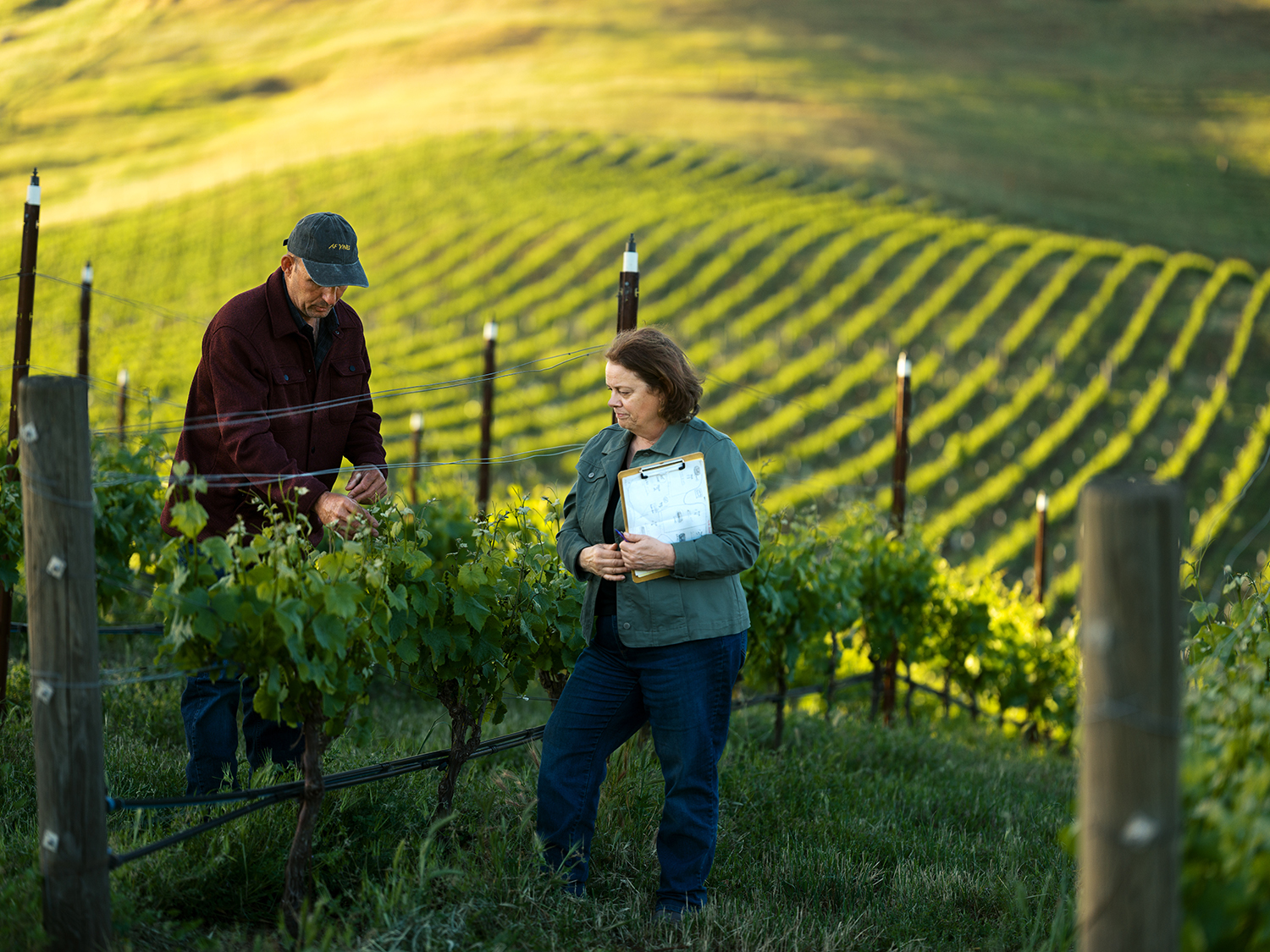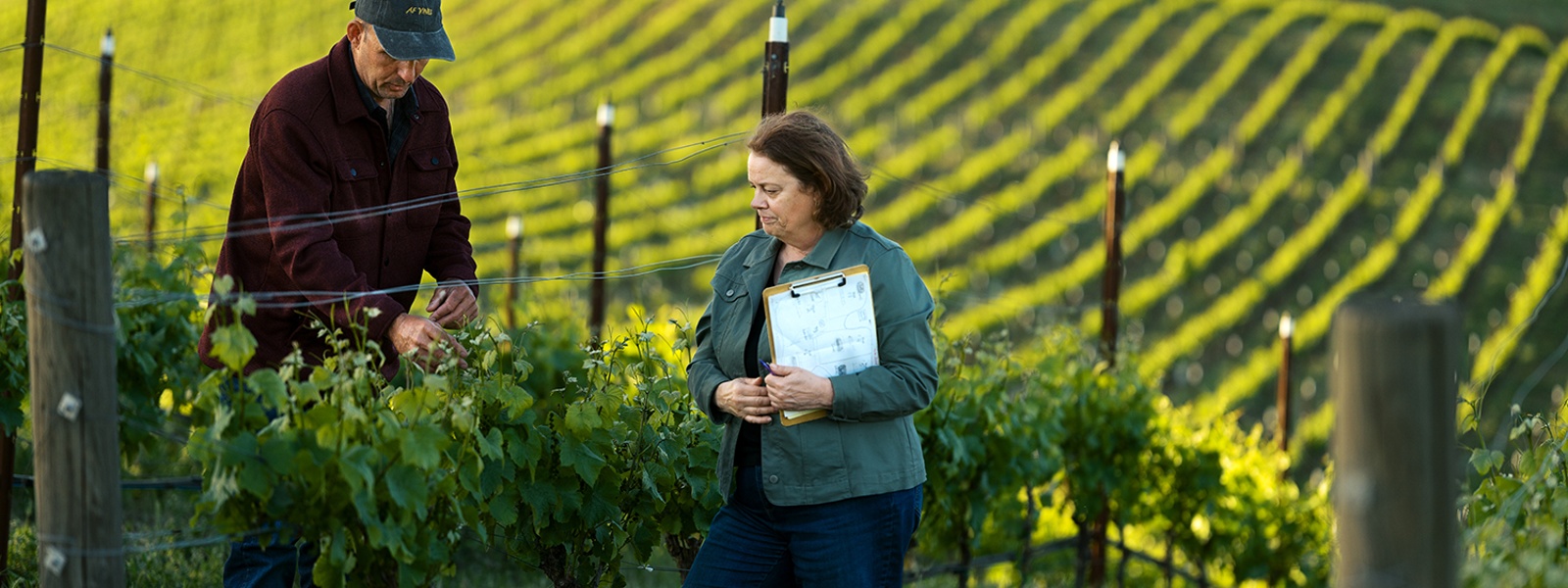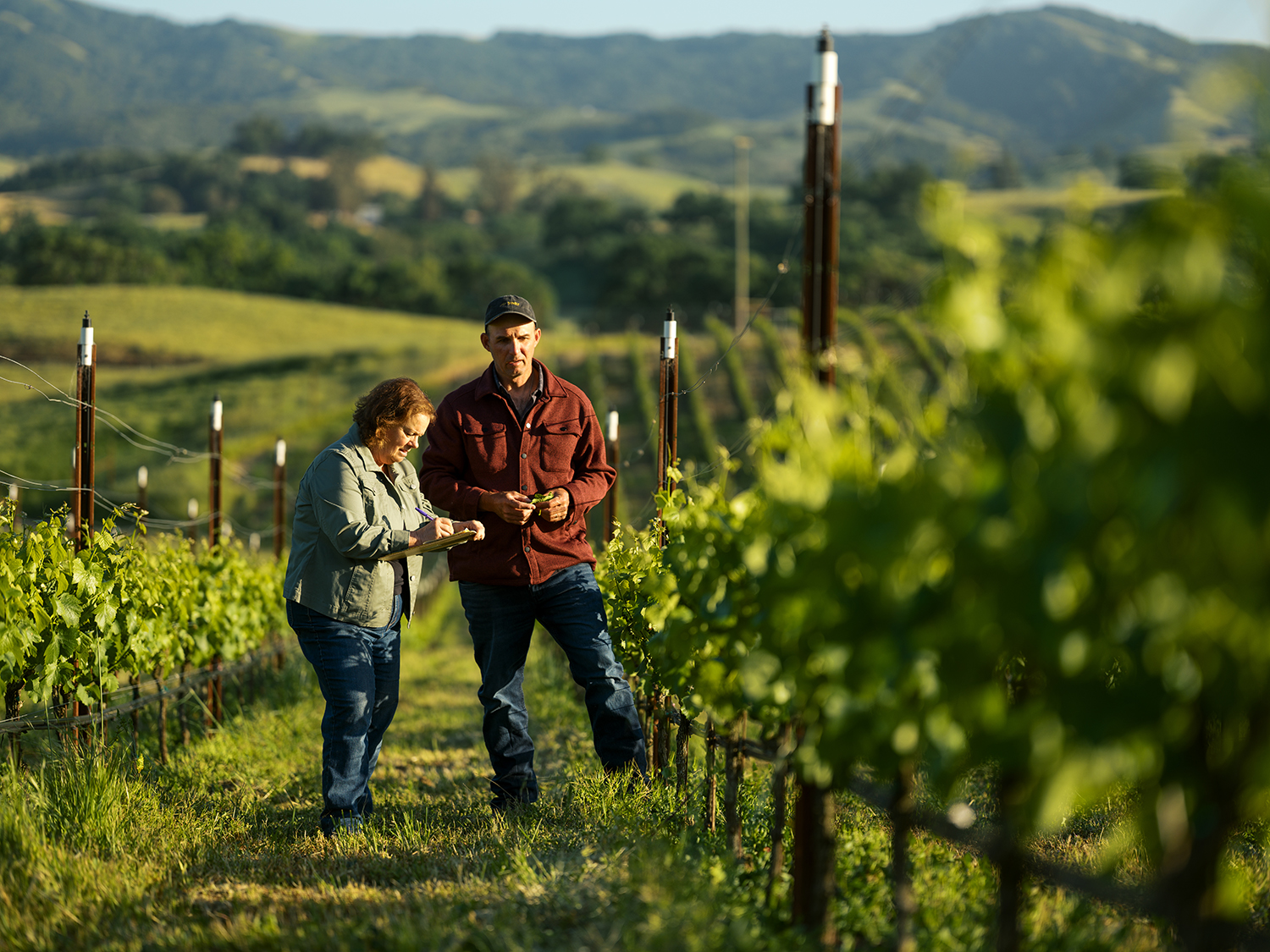Program pairs new farmers with seasoned mentors

Sonoma County winegrape grower Andrew Forchini, left, a mentor for the Expanding Our Roots program, works with grower Bea Charles at her vineyard in Petaluma.
Photo/Paige Green

By Linda DuBois
Andrew Forchini, a winegrape grower in Sonoma County, appreciates fellow farmers who have shared advice with him over the years as he’s navigated the challenges of running his business.
When he learned of an opportunity to mentor new winegrape farmers, he was eager to pay it forward.
Expanding Our Roots is a farmers and ranchers mentorship program run by the California Farm Bureau’s California Bountiful Foundation.
Launched in spring 2024, the program aims to help newcomers navigate the complexities of farming and ranching by giving them access to seasoned pros who can share the knowledge they’ve gained through years of trial and error, said Tyler Rood, senior project specialist at the California Bountiful Foundation and the program’s coordinator.
It connects farmers and ranchers with at least one year of experience to peers in the same specialty who have a decade or more of experience. Some mentees are entirely new to farming, and others have farmed for many years but are new to a specific crop or livestock animal. Still, others already have mentors and a good support network but are seeking to learn from new perspectives.
The program is funded through the California Department of Food and Agriculture Specialty Crop Block Grant Program and the U.S. Department of Agriculture National Institute of Food and Agriculture Beginning Farmers and Ranchers Development Program.
Participation is free for mentees. The foundation pays mentors $50 an hour for up to six hours, but many say they volunteer far more time, and while the stipend is a nice bonus, it’s not what motivates them.
“I don’t mind making the time,” Forchini said. “Whether it’s six hours or 30 hours or more, I’m available. This is important.”
He said not only does he want to help keep the agricultural industry thriving, but he just enjoys helping people.
In addition to mentorship services, the foundation provides mentees with additional resources including access to workshops, annual subscriptions to Ag Alert® and Farm Bureau Extension classes. The workshops are open to mentees and others and allow participants to network with peers and learn from experts in business planning, finance, agricultural production practices, postharvest handling and distribution, marketing and sales, laws and regulations, farm-ranch safety, and grant funding, including for conservation practices.
Forchini said the program can help encourage the next generation of farmers to replace those nearing retirement. Certain sectors of the agricultural industry are also up against increased challenges.
For example, Forchini and his two mentees, Carol Thong and Bea Charles, face a shrinking market as global wine consumption declines.
Forchini said he was impressed during his first visit to Lavio Ranch Vineyard in Petaluma, run by Charles and her husband, Mike, who has a background in livestock. But they lacked connections in the wine industry and the know-how to market their grapes.
“The vineyard is supposed to be our retirement,” Charles said, adding that her husband works full time in the vineyard while she maintains a full-time job as a bookkeeper. “In my current job, I don’t have much of an opportunity to talk with other growers on a day-to-day basis.”
She said she wanted to consult with a mentor with years of experience navigating changing market conditions.

Photo/Paige Green
“I wanted to hear Andrew’s different approaches to marketing because we’ve always marketed to just one person, and this year we might have to sell to several people,” Charles said.
One recommendation Forchini gave them was to highlight something that distinguishes their vineyard from others.
Besides managing a vineyard in Healdsburg, Forchini’s company, AF Vines LLC, does property repair and maintenance and raises sheep for custom grazing. When Charles learned about his work in regenerative livestock agriculture, she picked his brain.
“We’ve always put cows in the vineyard, and we just compared notes on that and the different options of improving our sustainability, and just any ideas he had on reducing costs overall,” Charles said. “He also shared ideas on dealing with some of the wildlife challenges that we face each year, especially birds, and pointed out some safety concerns for the tractor on our steep hillside.”
Charles said the mentorship has been everything she’d hoped for.
“I’ve gained an industry friend, but I also gained his valuable insight on the potential challenges that are coming towards us and a little more confidence to meet them,” Charles said.
“I’ve learned that getting caught up in the farming day-to-day stuff is not enough,” she added. “You have to focus on your marketing and building business connections because that’s what’s needed in today’s farming.”
David Cox, a fifth-generation farmer and nursery producer who runs L.E. Cooke Co. in Tulare County, became a mentor to help others avoid learning everything “the hard way” as he did.
“Some skills you don’t get taught in school. Some you learn through headache and heartache as life goes on,” said Cox, who mentors Chris Wichman, the assistant production manager at Belmont Nursery in Fresno.
Sutter County’s Sy Honig, who owns Honig Farms with his father, said he felt the same way when he learned of the program and was matched with Adam Kennedy, a Glenn County rice grower.
“I just think it is good to have multiple people you can call on if you have a question,” he said. “I have my dad, who’s been doing this his whole life, but he’s also been doing it his own way his whole life.”
Kennedy has answered a few of Honig’s questions about bookkeeping, but most of the benefit of the mentorship has been simply having one more person to bounce ideas off of, Honig said.
During its first year, the Expanding Our Roots program matched about 85 pairs, but with funding for 400, it has room for many more. It is scheduled to last three years but could continue beyond that if there is enough demand and the foundation can secure additional funding, Rood said.
He said the breadth of diversity in California’s farming sectors has made finding perfect matches a challenge, but as more farmers enroll in the program, it becomes easier to match them.
Some participants say they would recommend the program to other farmers.
“Agriculture is so difficult that you should never turn down an opportunity to learn from other people with more experience,” Charles said.
To learn more about Expanding Our Roots and to enroll or sign up for the next workshop—planned for July 24, from 10 a.m. to 4 p.m., in Sacramento—visit www.cfbf.com/eor.
Linda DuBois is the assistant editor of California Bountiful magazine. She can be reached at ldubois@cfbf.com.




